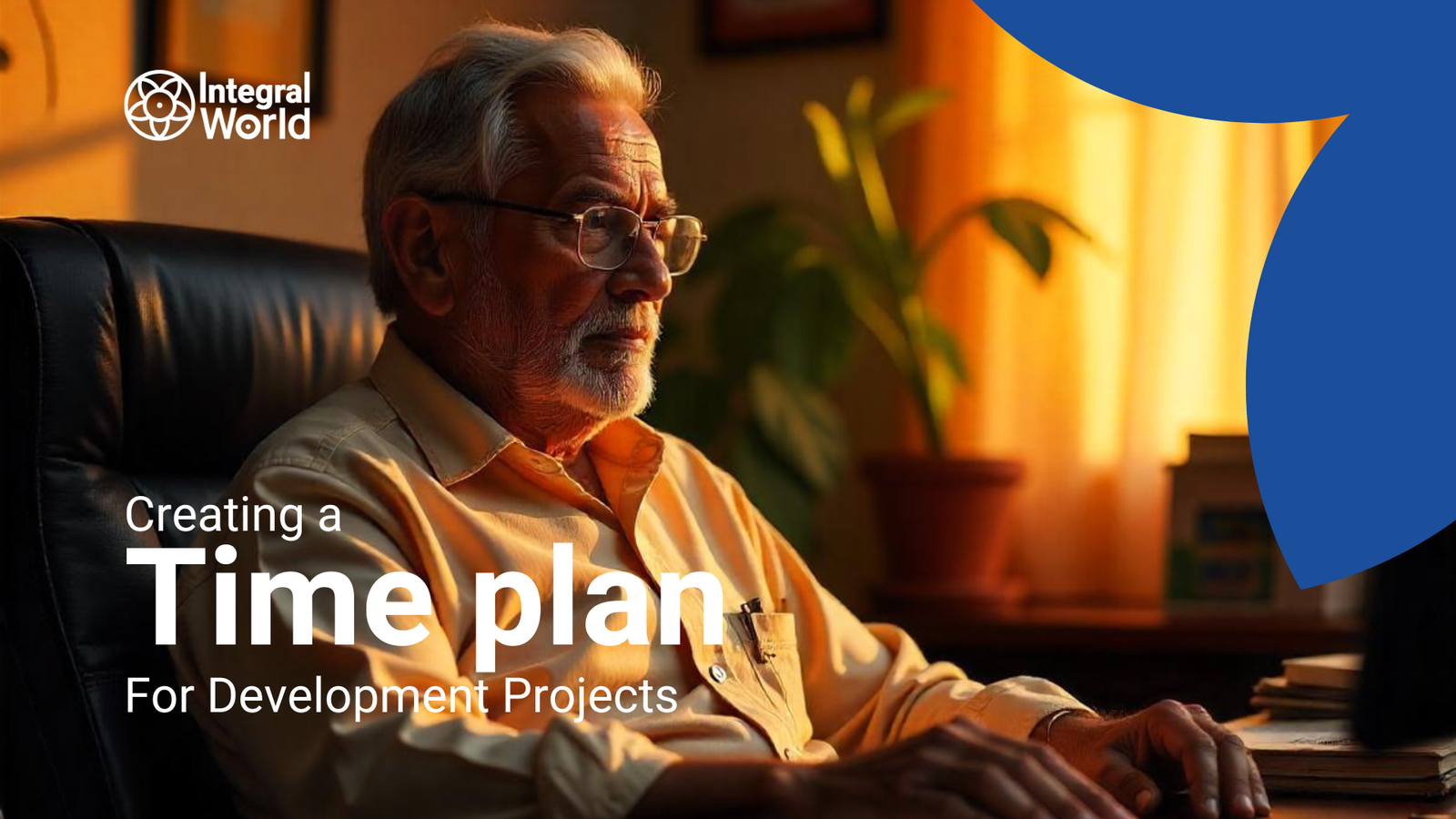Achieving desired outcomes and maintaining efficiency depends on good time management. An effective time plan can be the difference between success and failure for a project. At Integral World, we understand the complex nature of development projects and importance of having a well thought out time plan.
This article, drawing from experts in the field, data-driven predictions and practical advice goes into details about ways of creating an efficient time plan. These insights will help you navigate through the intricacies involved with timing be it as an experienced project manager or somebody just starting out.
When dealing with development projects that concentrate on community development, environmental sustainability or social change, there must be some structured approach to time management. If there is no clear-cut plan as to what should happen at any given time then projects may run late occasioning extra costs, resource depletion and undelivered goals.
At Integral World, we have become extremely experienced in guiding organizations through this complexity of time planning so that each project we carry out fulfills its objectives within the intended timeframe.
Understanding Time Planning in Development Projects
The Importance of Time Planning
Time planning entails outlining the tasks, milestones as well as deadlines required to complete a project. Effective time planning:
- Enhances Efficiency: By splitting the project into small parts through which team members know their responsibilities and due dates.
- Mitigates Risks: Projections of potential delays plus plans for contingencies go long way in minimizing risks therefore keeping your project on course.
- Ensures Accountability: Clear timelines for all activities foster accountability among team members and stakeholders.
- Optimizes Resource Allocation: Properly planned times ensure resources are allocated effectively thereby avoiding logjams and wastages in resource use.
Expert Insight: “Effective time management is the cornerstone of successful project execution. It requires foresight, planning, and the ability to adapt to changing circumstances.” – Elizabeth Harrin (project management author & consultant).
Steps to Creating an Effective Time Plan

Define Project Objectives and Scope
Prior to making a time plan, you need to have a clear understanding of the objectives and scope of the project. This would involve:
- Setting Clear Goals: Explain what you want to achieve with the project.
- Determining Scope: Highlight what is within the boundaries of your project including what it does not include.
- Identifying Deliverables: This entails listing down any tangible outcomes that will result from undertaking the project.
- Practical Advice: Engaging stakeholders early in order that their expectations match up correctly with these objectives and scope can be helpful.
Break Down the Project into Tasks
After defining objectives and scope, break your project into smaller tasks that are easier to manage. This is commonly called Work Breakdown Structure (WBS).
- Task Identification: List all tasks involved in completing the project.
- Task Sequencing: Decide which task follows another one while others must come first.
- Task Duration: Forecast how long each task will take.
- Example: For community development projects, tasks might include needs assessment, securing funding, planning interventions, implementing programs, and evaluating outcomes.
Establish Milestones and Deadlines
Milestones represent major phases or deliverables completion points along the timeline of a project. They help keep track of progress as well as maintain momentum for continued work on each phase until its completed successfully.
- Identify Key Phases: Divide your work into significant stages like planning, implementation or evaluation.
- Set Milestones: Assign milestones for these phases to mark important points of progress towards completion.
- Determine Deadlines: Set reasonable dates when each milestone shall be reached including specific activities within them.
Allocation of Resources
Effective resource allocation is important in keeping the project on schedule. It involves assigning the right people, items and finance to each responsibility.
- Identify resources needed: Determine human, financial and material requirements for each task.
- Assign responsibilities: Clearly define who is responsible for each task with provision of necessary resources.
- Monitor resource usage: Check regularly if resources are being used efficiently and make changes where necessary.
- Practical Advice: Use project management software to monitor resource allocation and predict potential shortages or excesses early enough.
Expert Insight: “Resource management is a dynamic process that requires continuous monitoring and adjustment to ensure that project timelines are met.” — Peter Taylor, author of “The Lazy Project Manager.”
Establish a Detailed Timeline
With tasks, milestones, and resources defined, it’s time to create a detailed project timeline. This timeline should include all tasks, their durations, dependencies, and deadlines.
- Use Gantt Charts: Gantt charts present a visualization of the project timeline showing tasks durations as well as dependencies between tasks.
- Include Buffer Time: Account for unexpected delays by adding buffer time so that there can be flexibility in your planning.
- Regularly Update the Timeline: Make adjustments to the timeline as progress unfolds or projects’ scope shifts.
Establish Monitoring and Evaluation Mechanisms
Continuous monitoring and evaluation are essential for ensuring that the project stays on schedule. This involves regularly reviewing progress, identifying any deviations from the plan, and making necessary adjustments.
- Regular Progress Reviews: Hold regular meetings to review progress and address any issues.
- Adjust the Plan as Needed: Be flexible and willing to adjust the plan based on monitoring and evaluation findings.
- Document Lessons Learned: Keep a record of lessons learned to improve future time planning efforts.
Expert Insight: “Monitoring and evaluation are critical for adaptive project management. They provide the data needed to make informed decisions and keep the project on track.” — Dr. Michael Quinn Patton, expert in evaluation and author.
Data-Driven Predictions for Time Planning

The Role of Data in Time Planning
Data driven approaches are transforming how development projects are planned out or executed; allowing organizations to improve their time plans based on more accurate predictions made possible through leveraging data.
- Historical Data: Studying data from previous projects helps understand task durations, resource requirements, risks etc.
- Real-Time Data: Real-time data collection is important because it facilitates monitoring of progress so as to make timely adjustments if required.
- Predictive Analytics: Through predictive analytics potential delays can be projected with response measures provided beforehand.
Example: Integral World uses past project information as an input into its time planning process. By analyzing patterns and outcomes we can create timelines that are more accurate than ever before.
Trends for the Future of Time Planning
- Artificial Intelligence (AI): AI-powered utilities can scrutinize enormous amounts of data and draw up project timelines, foresee possible risks, and propose ideal distribution of resources.
- Blockchain Technology: Blockchain makes time planning more transparent and accountable by storing unchangeable records of projects’ milestones and progress.
- Internet of Things (IoT): Internet-enabled devices can gather real-time information about project activities to help track development and identify problems promptly.
Expert Insight: “With this integration of AI with analytics in project management, future trends in Time Plan have taken a whole new dimension as it ensures nothing but utmost accuracy and foresight.” — Antonio Nieto-Rodriguez, global champion of project management and author.
The Expertise Of Integral World In Time Planning
At Integral World, we have a strong history guiding organizations through the complexities associated with time planning for development projects. Our approach combines industry best practices, data-driven insights, and practical experience to create robust time plans that ensure project success.
Practical Advice for Organizations
- Start Early: Initiate this process early enough so as to allow adequate time for proper planning and preparations.
- Engage Stakeholders: For stakeholder expectations to be met, they should be involved from beginning of the planning process all through its implementation
- Use Project Management Tools: Develop detailed timelines using project management software, monitor progress, manage resources
- Be Realistic: Set achievable deadlines; never be too optimistic. Always give allowance time due to unforeseen circumstances.
- Monitor Continuously: Ensure continuous monitoring and evaluation in order not lose track of your goals when making necessary adjustments.
- Document and Learn: Maintain records on lessons learnt from every project so that future improvements can be made.
Conclusion
Development projects must have a comprehensive plan with respect to time. Therefore organizations are advised to set objectives clearly while breaking down tasks into smaller units with milestones, allocate resources appropriately or continuously monitor the progress of such programs.
At Integral World we specialize in assisting organizations navigate complexities of time-planning. We combine expertise with data-driven insights from real experiences, positioning us as leaders in this field.
Integral World wants you to join and help it develop sustainably and holistically. Irrespective of whether you are starting a new project or improving existing ones, we have people who can support you. Explore our website to discover available services and how we support your developmental projects with expert assistance. We can build a more sustainable future together.


4 Comments
I’ve recently started a site, the info you offer on this site has helped me greatly. Thanks for all of your time & work.
I just could not depart your site prior to suggesting that I really enjoyed the standard information a person provide for your visitors? Is gonna be back often in order to check up on new posts
Hola! I’ve been reading your website for a while now and finally got the bravery to go ahead and give you a shout out from New Caney Texas! Just wanted to say keep up the good work!
I was just seeking this information for some time. After six hours of continuous Googleing, finally I got it in your website. I wonder what’s the lack of Google strategy that don’t rank this kind of informative sites in top of the list. Usually the top websites are full of garbage.
Comments are closed for this article!